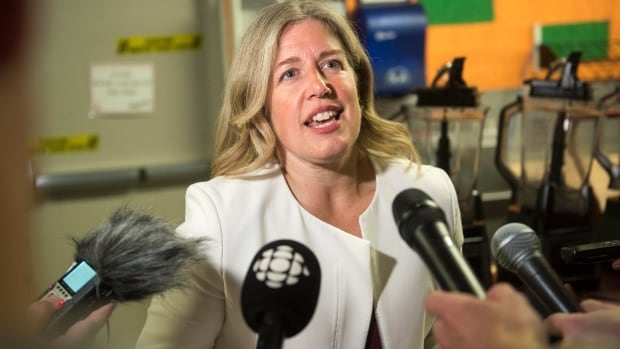Premier-designate Susan Holt says she will adopt a different gender-identity policy for schools when she takes power, potentially ending a year-long battle between the New Brunswick government and child and LGBTQ advocates.
Holt is adopting the policy recommended by Kelly Lamrock, New Brunswick’s child and youth advocate, which she said takes into account the rights of both parents and students.
For informal name changes, Lamrock’s version would mandate that school staff respect all students’ chosen names and pronouns if they’re in Grade 6 or higher.
For younger kids, name and pronoun requests would be evaluated on a case-by-case basis and granted if the request was reasonable and the child had the capacity to make that choice.
Premier-designate Susan Holt says she will adopt a gender-identity school policy recommended by Kelly Lamrock, New Brunswick’s child and youth advocate, when she takes power. She says this policy takes the rights of parents and students into account.
“The assumption is at Grade 6 that you should presume capacity,” Lamrock said in an interview. “If a four-year- old says call me Aquaman, you don’t have to call a four-year-old Aquaman.”
This policy would replace the current one, which prevents school staff from using a child’s chosen name and pronoun verbally unless they get parental consent, if the child is under 16.
Holt’s intention to change the policy was confirmed the day after the Liberals upset Premier Blaine Higgs and his Progressive Conservatives in a provincial election.
Holt also confirmed she will not continue wiith a plan to dissolve a district education council that was refusing to follow the PC policy.
The Higgs government’s policy was criticized by teachers, school psychologists, child development experts, unions and legal experts.
The Canadian Civil Liberties Association and the Anglophone East District Education Council filed separate lawsuits against the province, alleging the policy is discriminatory, unconstitutional and harmful.
Advocates have said the policy gives parents the power to force teachers to disrespect and hurt children by using a name and pronoun they don’t identify with, and forces kids to stay in the closet out of fear of being outed before they’re ready.
In an email, Alex Ash, executive director of LGBTQ advocacy group Chroma NB, said they are “very appreciative of Holt’s decision to reverse the harmful changes made to Policy 713.”

Ash said ideally Holt would revert back to the 2020 version, which was developed over the course of four years and included lots of consultation.
“It is important that Susan Holt and the Liberal government make sure these youth feel secure and protected before they change the policy again, even if many of Lamrock’s recommendations are sound,” Ash said.
“We can now breathe a little easier and refocus our attention on providing education and programming to the communities that we serve.”
All versions of Policy 713 — the original from 2020, the controversial one brought in by Bill Hogan, the education minister under Higgs, and the one recommended by Lamrock — require parental consent for official name changes on school records for kids under 16.
New policy would encourage parental involvement
Last summer, Lamcrock conducted two months of consultations with parents, teachers and experts and came up with the alternative version, which was not adopted by the previous government.
Lamrock’s proposed policy adds recommendations that no other version had: that school staff encourage communication with the student’s parents when possible, that they not question a child’s choice if they want to revert to a previous name or pronoun, and that they provide parents clear information about the policy.
Lamrock’s proposal also has a list of what school staff should not do. For example, it says they should not encourage medical intervention, impose their personal beliefs on the child, or disclose the students’ gender identity to other parties without their consent.
In an interview Tuesday, Lamrock said he proposed this policy after he was mandated by the legislature to conduct public consultation. Lamrock said that for two months, he reviewed more than 400 public submissions and conducted about 50 followup interviews.
Lamrock said he tried to make the policy explicit about medical interventions, for example, to assuage some people’s concerns about what happens when a teacher respects a student’s pronoun. Lamrock said in consultations he heard misinformation about teachers encouraging students to transition without their parents knowing, and wanted to assure people.
What about mandatory informing?
Lamrock said teachers and staff have a mandatory obligation to inform parents when their child’s safety or development is at risk. This includes if the child shares thoughts of self harm, for example, or if their grades are slipping and they’re failing class.
Lamrock said changing a pronoun does not fall under that category or require mandatory disclosure to parents.
“It is fairly well-established that, absent any other indicator, merely questioning or rethinking your gender identity does not put your safety or development in at risk,” he said.
Lamrock said he probably would not have reviewed the policy in this way if the issue hadn’t been brought up by the Progressive Conservative government at the time, but he sees no harm in addressing concerns.
Education council won’t be dissolved
Hogan started the legal process of dissolving the dissenting anglophone east council, and Holt confirmed this week that she would be putting an end to that process.
“We will also drop any plans the previous government had to dissolve the DEC and hope that through this we can develop the plan that works for students, parents, and teachers,” Holt said through a spokesperson.
The anglophone east council has appealed a judge’s decision to dismiss its lawsuit. At a New Brunswick Court of Appeal hearing Wednesday, a judge set the case aside to December because the case might be moot once the policy is changed.


